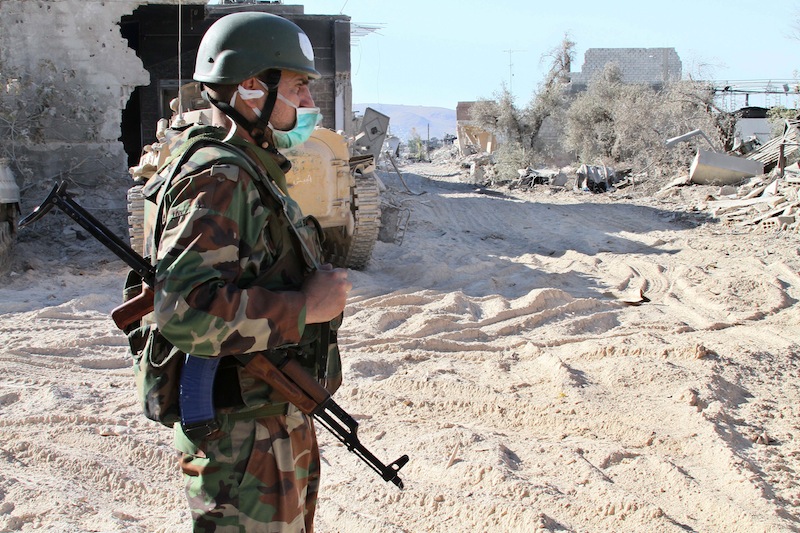In the release of a declassified intelligence brief, a strongly worded public pronouncement from Secretary of State John Kerry, and a background call with reporters, the White House made its formal case Friday for military intervention in Syria.
The bottom line, as Kerry outlined in his speech, is that the White House believes inaction, after conclusively determining that Bashar al-Assad’s regime is behind the Aug. 21 chemical weapons attack in Damascus, would open the possibility of other countries or groups concluding that they could use such weapons in the future without fear of retribution.
The public case that the Syrian regime used chemical weapons came amid questions about whether the White House should consult further with Congress or ask for authorization before launching an attack, apparent public ambivalence about intervention, and discouraging news abroad after the United Kingdom’s parliament rejected a resolution to join a U.S.-led military strike.
“Make no mistake, in an increasingly complicated world of sectarian and religious extremist violence, what we choose to do or not do matters in real ways to our own security. Some site the risk of doing things. But we need to ask, ‘What is the risk of doing nothing?’,” Kerry said. “It matters because if we choose to live in the world where a thug and a murderer like Bashar al-Assad can gas thousands of his own people with impunity, even after the United States and our allies said no, and then the world does nothing about it, there will be no end to the test of our resolve and the dangers that will flow from those others who believe that they can do as they will.”
President Obama said in a later statement Friday afternoon that he had not made a final decision about what course of action to take.
In the four-page intelligence brief, which senior administration officials said was “fully vetted” by the U.S. intelligence community, the U.S. government said that it had “high confidence” that Assad’s forces were responsible for the chemical attack, which the administration said killed 1,429 people, including 426 children. “Our high confidence assessment is the strongest position that the U.S. Intelligence Community can take short of confirmation,” the government said in the brief.
The intelligence community assessment documents the Assad regime’s chemical weapons capability, reportedly the greatest in the region, and the regime’s frustration with being unable to eradicate the Syrian rebels from certain sections of Damascus’ suburbs. The intelligence community said it has concluded that the weapons used in the attack were the same ones that the Assad regime had in its possession; that the weapons had been launched from Assad-controlled areas of the city to 12 rebel-controlled neighborhoods, according to satellite images; that regime officials were aware of the attack and, following it, ordered regime units to bombard the rebel areas that had been hit in the attack, according to an interception of the communications of a senior official.
That post-attack bombardment was motivated by the regime’s concern that United Nations investigators would find evidence of an attack, according to senior administration officials. There were also pre-attack indications, such as the utilization of gas masks, by the regime forces that indicated to U.S. intelligence that an attack was imminent.
“We assess that the regime considers chemical weapons in its portfolio of military use,” a senior administration official told reporters. “It is not considered an extraordinary measure.”
Though a Foreign Policy report suggested that the Aug. 21 attack might have been a mistake, senior administration officials stated unequivocally that it was not. When pressed whether Assad had ordered the attack, officials said that Assad is “ultimately in charge of employment” of chemical weapons, but declined to disclose more details.
The White House also said it was confident that the Assad regime had initiated smaller-scale chemical weapons attack prior to the events of Aug. 21. Senior administration officials said the White House had verifiable physical evidence of chemical weapons being used in those attacks, but that such evidence had not yet been collected from the Aug. 21 attack.
They asserted, though, that the body of other intelligence and the Assad regime’s previous use of chemical weapons led to their “high confidence” that chemical weapons had been used in the larger attack.
Senior administration officials also indicated that they had other evidence that could not be disclosed, but was being shared with Congress and international partners.
The White House is reportedly considering limited air strikes on military targets as retaliation for the Assad regime’s use of chemical weapons. Senior administration officials also repeated that the administration is not aiming to achieve a regime change in Syria.
Kerry said in his speech and Obama reinforced in his later statement that any intervention would not include “boots on the ground.”






